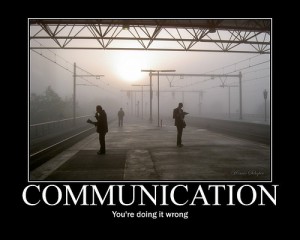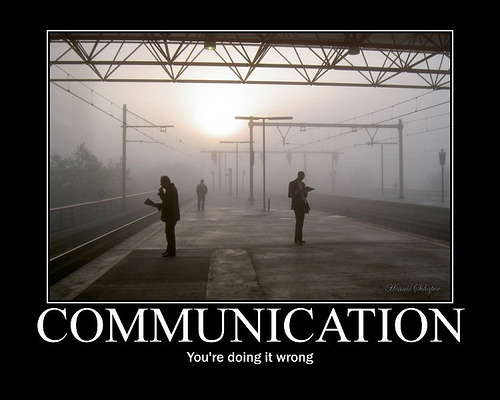One of the side effects of the digital age is, instant communication, which in and of itself is good, except when it ain’t. Time was when a man had nothing to say, but felt he should write, the fact was known firsthand by a few unlucky souls and his impulses squelched by an editor. Today, with tweets, blogs, RSS feeds, and constant updates on social media, we endure a barrage of banality.

Courtesy of Art Rock (Hennie)
Every celebrity, every wanna-be, each famous- for-being -famous twit can now share with us the finer points of their navel gazing. It’s enough to make a man retreat to the solitude of his office if only to escape the babble.
You might think that business communications would be safe, with the need for networking, and keeping the company in the black, concise clarity would eventually triumph. You would be wrong, much business communication now seems to be written in two separate languages; Psuedo- Poetic Metrosexual Mumbling (think: Alan Greenspan’s “Irrational Exuberance” speech) and Obfuscatory Legalese (think: Mortgage, Cell Phone or Cable Contract). No where is this blight more prevalent than in e-mail. People, that in face to face encounters are the very soul of brevity and wit, will without warning or provocation send out e-mail that take days to decipher. The disease is highly contagious, with even those who think themselves immune, succumbing to the sickness and spreading the contagion. If, for instance, the e-mail detailing the successful legal defence of your company’s best-selling widget against the evil patent infringement of competitor X, reads more like War and Peace when it should be “Veni, vidi, vici” then you have the disease.
E-mail is a special case. Here are 10 Principles to follow that will make your e-mail clear and a pleasure to read.
The Foundation
1. To – Who are you sending this e-mail to? Try to have some idea of your intended audience. How do they take in information? Is it pertinent to them? Too many people receiving the same message leads to “Diffusion of Responsibility”, since everyone knows what needs to be done, everyone assumes that someone else will do it. The more important the e-mail the greater the need to focus on its recipients.
2. Subject lines – Newsflash: the subject of your email should reveal what is in the email. It’s remarkable how often people avoid doing this. Often times, you’ll find success by using the first sentence of your email as your email subject line.
3 Purpose – Always have a purpose for your email — but only one purpose. If you want a response, then your email should have a clear purpose. If you’re simply “networking” or just “want to chat,” then you should still have a purpose. Do some background research. “Hi Bill, I saw your work at the Blank Conference. I would love to talk further about your ideas on X. Are you available for lunch, say on Tuesday, May 15th at 11:00am at Blank Restaurant?”
4. Write in full sentences – Capitalize appropriately, and use proper punctuation. All of the writing basics that you learnt in fifth grade still apply.
How To Get Responses
5. Ask for a response– People consume at leisure, but they produce on command. The simple fact of the matter is that most people spend 99% of their time consuming. (For example, right now you are “consuming” this guide by reading it.) Now, there is nothing wrong with consuming, but you must understand that it is the default behavior for people.
But when someone sends a response to your email, they must produce it. The vast majority of people produce on command. They pull money out of their wallet when the cashier asks for it. They turn left when the light turns green.
The lesson? People will reply to your email if you ask them to.
6.Kill procrastination – Anything that seems like it will take time, makes people want to procrastinate. It’s easy to send a short reply to a short email. Reduce the ability for procrastination. The reason most emails never get responded to isn’t because they don’t get read. It doesn’t get a response because it’s too long for someone to make a decision on right away. If you make it hard for them to make a decision immediately, then it gets placed in the “To Do” pile. Sadly, that pile is usually Never Done.
Quantify the time that it will take or the benefit that they receive. Most people might not be crazy about math, but they love numbers. because numbers help put things into context. It is easier to understand “3 quick interview questions” or “5 page TPS report”
7. Do the work for them – If you can’t really figure out what the main question is that you need to ask and instead decide to type out a 3 paragraph email, then you’re essentially saying, “it’s not important enough for me to figure out what the main idea of this email is, so I’m going to make you do it for me.”
Eliminate errors by eliminating sentences. Shorter emails are more work because they require more revising. Do it anyway. In the words of Elmore Leonard, “I try to leave out the parts that people skip”.
8.Set deadlines – You need to let people know when they should contact you and do it clearly.
9. Respond to negative email quickly and decisively – If you’re sending out a lot of emails or working on many projects, then you’re bound to mess up every now and then. We all make mistakes.
That said, there is nothing more absurd, than two adults yelling at each other through cyberspace.
Keep your response short. The longer and more defensive you get, the worse off you will be.
Example:
“Mark,
I think there has been a misunderstanding here and I want to make sure we are on the same page. Can you call me at XXX-XXX-XXXX?
Jack”
10. Don’t hide behind email – The ability to collaborate and interact through cyberspace does not mean you shouldn’t handle your responsibilities in the real world. If you messed up and someone sends an email asking you to step up, then shoulder the responsibility and get it done without a fuss.
Furthermore, sending an email doesn’t always mean that you “did your part.” Don’t act like since you “sent it” you’re in the clear. Shift your responsibility to cyberspace is just as bad as blaming it on someone else. Sometimes you need to pick up the phone and get an immediate answer. Sometimes you need to meet face-to-face. Just because you’re good at email, doesn’t mean it’s the best bet.
Finally, it is a continuous source of amusement/amazement that despite any number of scandals and indictments, that many people forget that e-mail can be stored, forwarded, and submitted as evidence in criminal and civil courts. If your e-mail is about the physical attributes of the new intern or something that you don’t want seen in the daily newspaper, step away from the keyboard and reconsider before you push the “Send” button. Follow these tips any you’ll be commanding respect in cyberspace in short order.

Nice, thank you.
Hey, I need to talk to the administrator of this site. Apparently your blog was featured here: http________________ and was curious if it was with your approval or not…
The video to go with your link was interesting but too long. That’s not the reason that I’ve removed your URL from the message and the comment. Your method is sleazy even if the product was not. Please don’t come back.
I’m not a writer, just a reader. I’ve written this comment from my heart in hopes it is useful feedback to you.
I was hoping to get some tips from your post, but I did not. Perhaps you should apply #6 to it, the second #6, 2nd paragraph of it. There are so many errors in your post I actually wonder if you were bating us to point them out. As for my opinion, I think it’s too long. If you added many more numbers (than 10)to match all your points, pithy headlines could be all you need. Remember as it stands now it should read 10 not 9 guidelines.
Why did I bother to write this?
The post needs work to be worth telling others about, but it might be good practice for you to look it over ans see how you might rewrite it as the topic is worthy. (And why Manly?) We can all write better emails and comments >:)
Thanks for your comments. You are correct, it could be edited for brevity. I did correct some of the mistakes you pointed out and hope it makes for better reading.